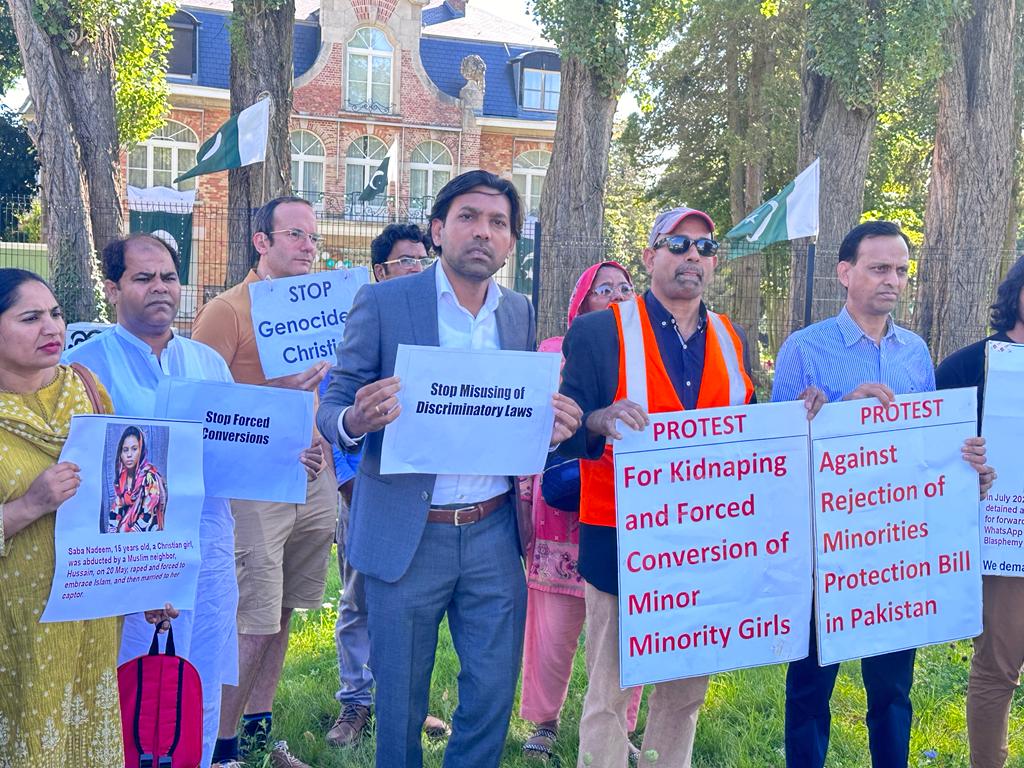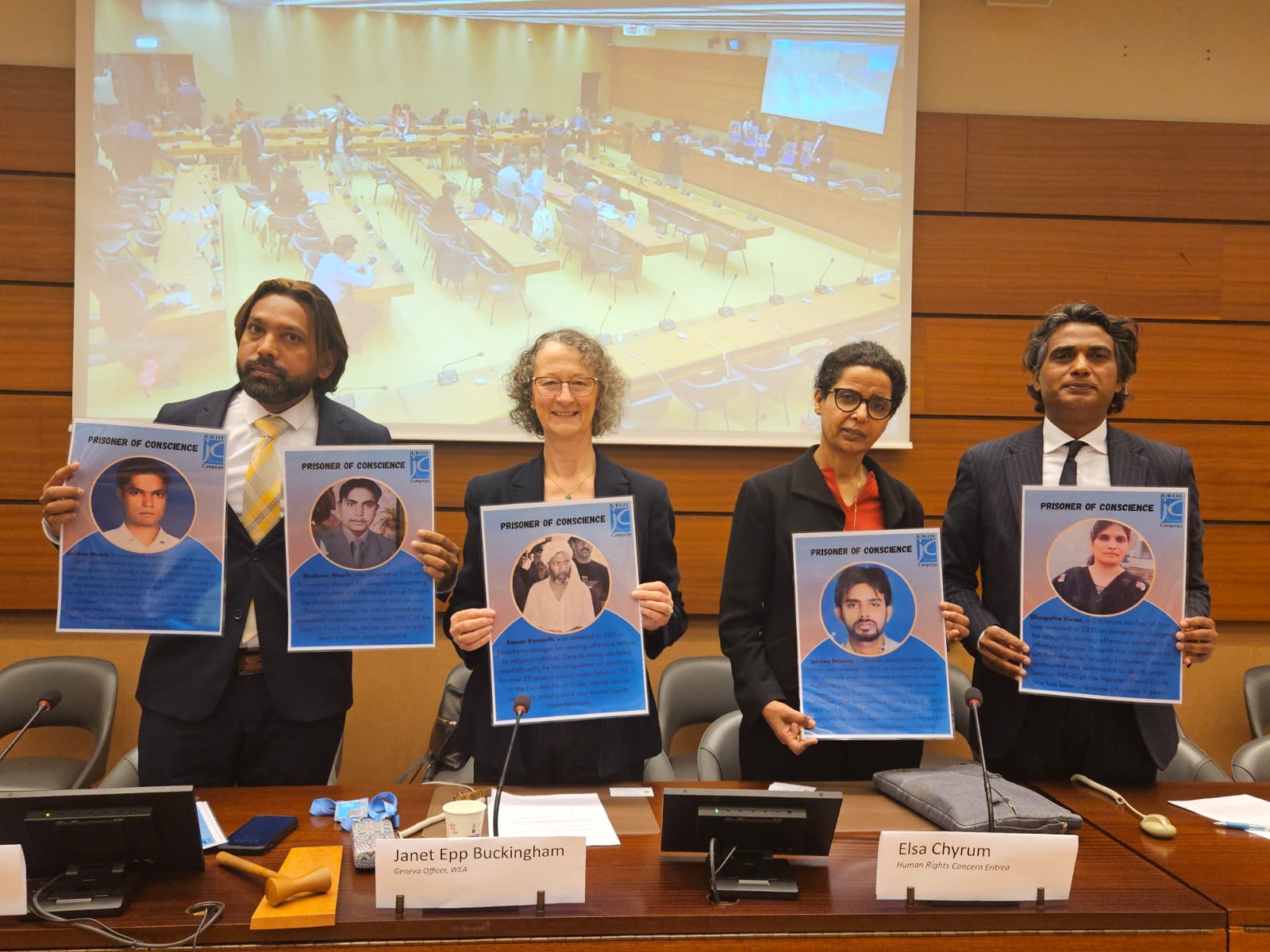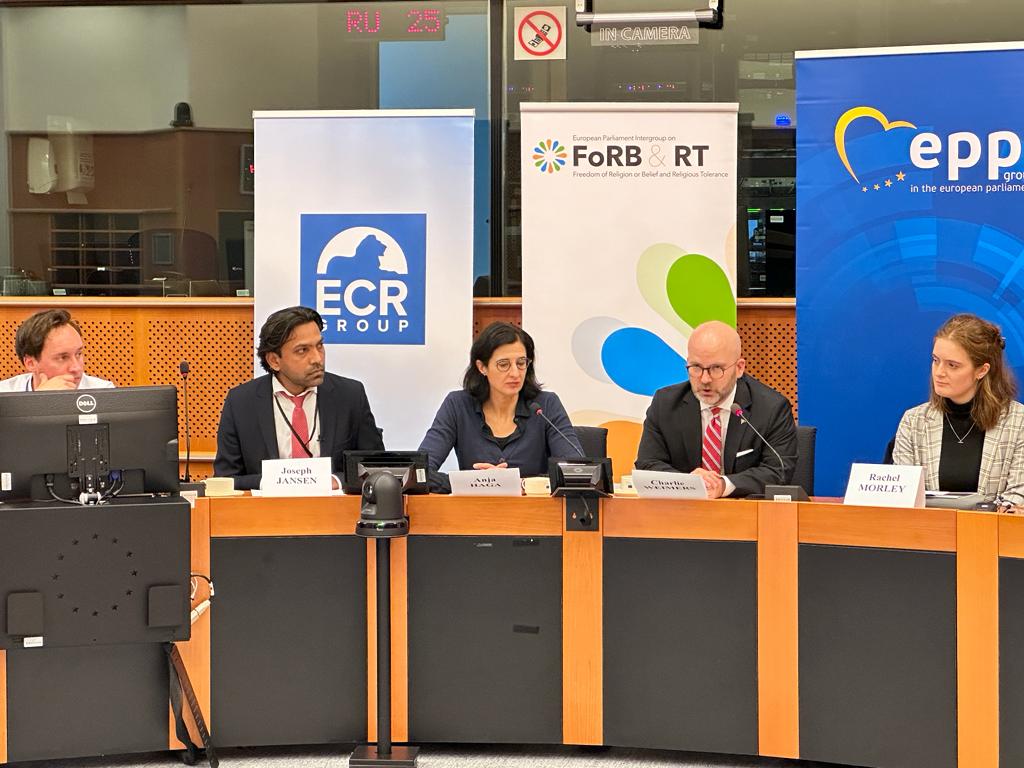(Brussels – August 14, 2023): The government must take tangible steps to improve religious freedom conditions and state of minorities’ rights in Pakistan, and the European Union must not extend Generalized System of Preferences (GSP) Plus status for another four years unless Pakistan demonstrates progress on its human rights obligations, and make a commitment to introduce a law to criminalize forced conversions, and introduce legal and administrative safeguards to prevent the misuse of blasphemy laws in Pakistan. This was demanded in a protest demonstration staged by the activists and overseas Pakistanis under the aegis of the European Pakistani Action Committee for Religious Freedom in front of the Pakistan Embassy in Brussels on the Independence Day of Pakistan.
Speaking at the protest, Joseph Janssen emphasized that the extension of GSP Plus status must not be granted unconditionally, instead it should be contingent upon Pakistan’s genuine efforts to uphold religious freedom and fulfilling its human rights obligations. He called on both the Pakistani government and the European Union to engage in constructive dialogue to ensure that the extension of GSP Plus status is tied to verifiable progress in addressing the forced religious conversion and abuse of blasphemy laws.
Jansen further added said that the United Nations’ Human Rights Committee has called upon all states to repeal blasphemy laws or amend them in compliance with the strict requirements of the International Covenant on Civil and Political Rights (CCPR). Moreover, the European parliament in 2021 passed a resolution calling on Pakistan to repeal sections 295-B and 295-C of the PPC to respect and uphold the freedom of religion and expression and amend the Anti-Terrorism Act 1997 to avoid trial of blasphemy cases in anti-terrorism courts. However, Pakistan did not introduce any measure to amend or repeal blasphemy laws despite they are incompatible with the Covenant on Civil and Political Rights (CCPR). Instead, Pakistan introduced some regressive developments to make the blasphemy laws stricter.

Ch. Khalid Sadiq said that the UN treaty bodies and UPR working group have been making recommendations to Pakistan calling for improved religious freedom conditions by reforming blasphemy laws and criminalizing forced faith conversions in Pakistan, however, the government of Pakistan failed to implement them due to a lack of political will. The denial of fact and refusal to implement the recommendations made by UN treaty bodies has entailed grave costs in enormous suffering for the people at large and religious minorities in Pakistan specifically.
He said that the right to convert in the context of Pakistan means conversion to Islam only, whereas conversion from Islam to any other religion is generally interpreted as apostasy, punishable with death. The government authority NADRA responsible for issuing national identity cards, puts a restriction on religious conversion away from the majority religion ‘Islam’. Moreover, Pakistan failed to pass laws to criminalize forced faith conversions owing to objections raised by government religious bodies particularly the Federal Ministry of Religious Affairs and the Council of Islamic Ideology.
Arif Sardar said that UK government sanctioned a Muslim Cleric, Mian Abdul Haq for supporting forced conversions and child marriages of girls and women from religious minorities. It is lamentable that the Ministry of Religious Affairs (MoRA) and the Council of Islamic Ideology (CII) invite persons like Mian Abdul Haq (Mitha) involved in forced faith conversion in their meetings and seminars to deny facts and reports of incidence of forced conversions as propaganda.
Sardar added that religious groups have a role in policy reforms as exemplified in several instances where the Council of Islamic Ideology, and the Ministry of Religious Affairs determine the Government’s regressive position on forced faith conversions, child marriage, and blasphemy laws inconsistent with human rights standards despite there are progressive judgments courts issued by the Supreme Court of Pakistan, Lahore High Court, and the Federal Shariat Court issuing a ruling that the child lacks the legal capacity to change religion on her own, and to enter into marriage.
Mirjam Bos with Jubilee Campaign noted that Pakistan strongly reacts to the treatment of Muslims in the world, dubbing it Islamophobia, however, it denies the genuine issues related to religious freedom involving complaints of misuse of blasphemy laws and forced religious conversions that minorities face in Pakistan, calling it propaganda. The double standards adopted on the basis of religious affiliation, must end now, and Pakistan needs to take serious efforts to treat citizens equally. She said that Pakistan promoted a narrative of “Islamophobia”, on behalf of OIC at international forums. In line with its earlier prototype resolution “defamation of religions” which had been passed 12 times by the UN bodies, Pakistan pressed the resolution and UN General Assembly passed it in March 2022 which meant a diversion of attention from the abuse of blasphemy laws inside Pakistan.
Tamar Sadiq emphasized religion is misinterpreted and blasphemy laws are misused for political motives by certain elements which resort to violence to influence policymaking, however, the state remains insensitive and society largely is unaware of the cost of such a skewed polity. He lamented that the parliament passed an amendment act to increase punishment for the accused under section 298-A, which will surely open avenues for its further abuse, allowing complainants to make fabricated blasphemy accusations against individuals they had grudge against. He added that existing blasphemy laws serve as a firewood plank for some religio-political groups to facilitate and perpetrate acts of violence against the accused on the mere accusation of blasphemy. He expressed concerns over the including the charge under section 7 of the Anti-Terrorism Act against blasphemy accused in addition to Section 295-C of the Pakistan Penal Code under the influence of religio-political party is a dangerous practice, and it will make the blasphemy accused more vulnerable, and fuel mob justice.
The demonstration was marked by speeches, placards, and chants demanding justice for victims of forced faith conversions and blasphemy laws, and calling for reforms in the Pakistani legal system to address the growing concerns over the targeting of religious minorities and dissenting voices. The participants reaffirmed their commitment to advocating for policy reforms without discrimination and pledged to continue raising their voices until concrete steps are taken to address the issues at hand.
The participants demanded the following actions by the government of Pakistan:
Amend all blasphemy laws to introduce impregnable and effective safeguards, remove restrictions on religious freedom, and ensure that the accused of blasphemy are not tried under the anti-terrorism act, and receive a fair trial.
Adopt and enforce legislation aimed at criminalizing the offense of forced conversions, and take measures to halt abductions, child marriage, and forced marriages of girls and women from religious minorities.





